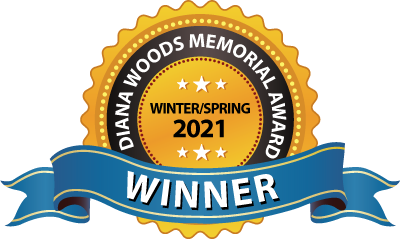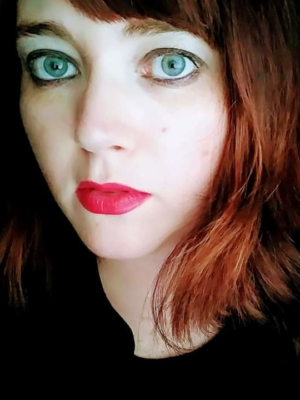A Message to My Mother in Morse Code
 You asked me how it felt, my belly swollen with cramps and emptiness.
You asked me how it felt, my belly swollen with cramps and emptiness.
Those were the cold-spark days when winter kept us huddled in bed. You were worried about how much pain I was in, but I had no answer to give that didn’t end in blood, so I turned my head due west and pondered the slice of sky framed in the window. All my words stuck jelly-thick, piled in the back of my throat. I wanted to unstick them, to spill out, I’m sorry, the pregnancy is not viable, and we were just so excited, but I knew I would never be able to recreate the doctor’s insouciance or the way my mother’s face crumpled, so unlike her to cry. That was the worst of it, seeing her laid bare. How do you find the words to describe that the hardest part of a miscarriage was the frayed tightrope of your mother’s mouth?
***
Once, when I was young enough for the universe to ignore, the trailer behind ours caught fire. We were tougher then, food stamp-resilient. She worked at a factory during the day with fingers calloused by sewing needle stings and came home with stories about her boss, a man who liked his employees petite and eager to please. She was only one of those things. I listened to her tell my dad about walking out and felt a swell of pride for her. Not because it was such a brave thing to do, but because it felt like a threat, a warning.
And later, when the fire flushed our neighbors from their tin house and called the sirens, she and I sat on the back porch and ate garden tomatoes with salt. We let the juice run down our arms while we watched the world burn.
***
Here’s what undid me: The way my womb throbbed and stuttered after midnight, spelling out Morse code. The only tether to the women who came before me was casting letters in my darkness, writing a story about weakness. It was tangled with the memory of my grandma dragging me to her church in the woods, aged eleven-and-a-half and sick with cramps; I bled onto a hard wooden bench while we learned the right ways to be afraid from a man who spoke in tongues. When we left, I was sure I already knew how to be afraid. I wanted my mother.
How many ways did our blood connect us? From the roughly hewn hills of Appalachia, those Ohio roads led down to Kentucky and splintered off, just as we did. Three women from the same line, all choosing our paths or having them chosen for us. It felt like a failure on my part, that loss of control over my own body. It felt like a picture of my heart that was never developed, like I was looking at a negative in sepia tones and trying to make sense of it.
Those women I was birthed from yet never knew, they held their cards close. They had learned from young ages to be careful about revealing themselves, never leaving an opening for me to crawl into and find comfort. They withheld, keeping soft words hidden beneath sharp tongues because the dirt that shaped and formed them was unforgiving.
There were so many thresholds we might have crossed together, but I could never find my keys.
***
On the day my mother announced we were leaving, I felt guilty.
There was only a sliver of sadness for what I’d already come to think of as my “old life.” I’d miss the trailer park because it was familiar. I’d think about my friends often once I got to the city, but those were pale and insubstantial. Like soap bubbles. Relief tingled my fingertips when I thought of my father, of how we’d put distance between us and him. I wanted that ending for her.
It wasn’t enough. I hungered for her attention. I was a walking, exposed ribcage. Just the two of us living in a tiny duplex, two against the world, she said. But she was young and raising a child who was 50% mistake. When I dreamed of my friends from the trailer park dying in a fire, she told me I could stay home from school but never asked about the flames.
***
The morning after, I was hungry and ashamed of it. You said you would get whatever I wanted. That hunger was a good sign. You sat patiently on the edge of the bed while I struggled to wrap my brain around something tangible. I craved Halloween candy, a hamburger without the bun, macaroni and cheese: the foods of my trailer park childhood. I apologized for our loss and felt my throat close up with salt because what I wanted was something I couldn’t ask for: a tomato fresh from the ground and ripe with fecundity, a doorway to walk through.
Amanda Crum is a writer and artist whose work has been published in Barren Magazine, The Hellebore, Eastern Iowa Review, and more. She is a Pushcart Prize, Best of the Net Award, and Indie Horror Book Award nominee. Amanda lives in Kentucky with her husband and two children.





